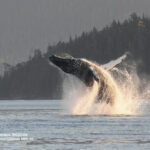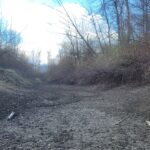As wildfire season looms, experts are warning BC residents to prepare their homes and communities for another challenging summer. Last year saw the worst forest fire season this province has ever seen, with a total of 2.84 million hectares of forest and land burned. Last year’s fire season, in addition to the ongoing multi-year drought, has primed the province for an already concerning 2024 wildfire season.
Lori Daniels, Koerner Chair of the Centre for Wildlife Coexistence at the University of British Columbia (UBC), says now is the time to get your home ready, as nearly one hundred fires from last season are still burning in northeast BC, with newer wildfires breaking out frequently. She recommends reading up on BC’s FireSmart program guidelines – a provincial resource with tips on how to ensure your home and community are wildfire resilient.
“We encourage homeowners to “FireSmart” their homes and yards this spring. . . in advance of fire season.”
Lori Daniels, Koerner Chair of the Centre for Wildlife Coexistence at the University of British Columbia (UBC)
“Each of us has a role in coexisting with fire,” Daniels stated in a UBC News interview. “We encourage homeowners to “FireSmart” their homes and yards this spring. . . in advance of fire season.”
“Check roofs, clean gutters, and clear yard clutter. Opt for non-flammable landscaping when planning gardens and avoid cedar hedges and junipers,” Daniels said. She added that citizens ought to be particularly careful with outdoor activities: extinguish campfires completely, watch out for motorbike or ATV engines sparking grass fires, and never discard a burning cigarette in a dry area.
Daniels said wildfire professionals are also undertaking preventative ‘forest thinning’ measures. This includes taking out small trees and preserving larger ones, which can slow down forest fires and aid firefighters in their battle to keep blazes from reaching homes.
“There are extra benefits when forest thinning treatments are combined with controlled burns in the understory, whether through prescribed fires or Indigenous-led cultural burns,” she commented, pointing to the success of the ?aq’am First Nation’s action that saved many homes in southeast BC during the St. Mary’s River fire in July 2023.
Record-Low Drought

Record-low snowpack levels are adding to concerns about drought conditions that could exacerbate this year’s wildfire season. Tim Morris, Project Director of BC Water Legacy and member of the BC Watershed Security Coalition, reported the snowpack is currently 37% below the annual average, the lowest level seen in two decades.
“We were already in a multi-year drought coming into this year and facing a water deficit,” he said, adding that we need to understand that “we have less water than we think we do.”
Morris said it’s time for the BC government to implement stricter rules around industrial use of our water supply. Most industrial water users are not required to meter or report their actual water use compared to what they are licensed to use. He says the biggest industrial users in BC pay just $5 for every Olympic swimming pool worth of water – less than an average pint of beer.
He advocates for increasing watershed protections that can help capture snowmelt and rainfall. “Restoring wetlands, protecting mature and old-growth forests, and reintroducing beavers have been shown to be extremely effective at keeping the landscape wet for longer and providing storage for a wide range of needs,” Morris explained. Making our watersheds more resilient not only eases the drought, he said, but also prevents the vast spread of wildfires.
“Wildfire management is becoming more challenging in BC, across Canada and around the world due to climate change.”
Lori Daniels, Koerner Chair of the Centre for Wildlife Coexistence at the University of British Columbia (UBC)
While we can hope for a wet spring, wildfire experts like Lori Daniels say the sooner we can prepare our ecosystems for a harsh wildfire season, the better. “Wildfire management is becoming more challenging in BC, across Canada, and around the world due to climate change,” Daniels said to UBC News. “Transforming forest and fire management is critical for our society to adapt and be ready for future fire seasons.”
Government Preparedness

Premier David Eby said last month he was already “profoundly worried” about the upcoming forest fire season. During the annual budget announcement, he announced that the province is taking precautionary measures, including setting aside $10.6 billion in contingency emergency funds over the next three years and organizing an “army” of firefighters.
“We have seen the devastating consequences of climate change on our communities, and we are using lessons learned from last year to strengthen our approach to emergencies.”
Bowinn Ma, Minister of Emergency Management and Climate Readiness
“We’re taking action earlier than ever, and preparations for this year’s wildfire season are already well underway,” said Bowinn Ma, Minister of Emergency Management and Climate Readiness, in a news release last month. “We have seen the devastating consequences of climate change on our communities, and we are using lessons learned from last year to strengthen our approach to emergencies.”
Part of this response is BC’s new Expert Task Force on Emergencies, which was created to apply lessons learned to future emergencies after last year’s disastrous wildfire season. The program is mandated to expand the number of firefighting tools for BC Wildfire Service (BCWS) crews, streamline training for Emergency Support Services (ESS) responders, and implement wildfire predictive technologies. The Task Force is also training community members in wildfire response – the program has already received 2300 applications, more than twice the number in 2023.
The BC government has also just announced its investment in a new dedicated wildfire training and education centre at Thompson Rivers University. The program is the first of its kind in North America and “will offer comprehensive wildfire training and education programs that progress from basic skills training and learning in the wildfire field.”
“Climate change is here, and there is no evidence that it is slowing down,” said Minister Ma in a press release for the wildfire centre. “The steps we’re taking today will provide our future generations the tools, training, and expertise they need to continue to protect people and communities in an ever-changing climate.”
This story has been updated as of April 11, 2024.




